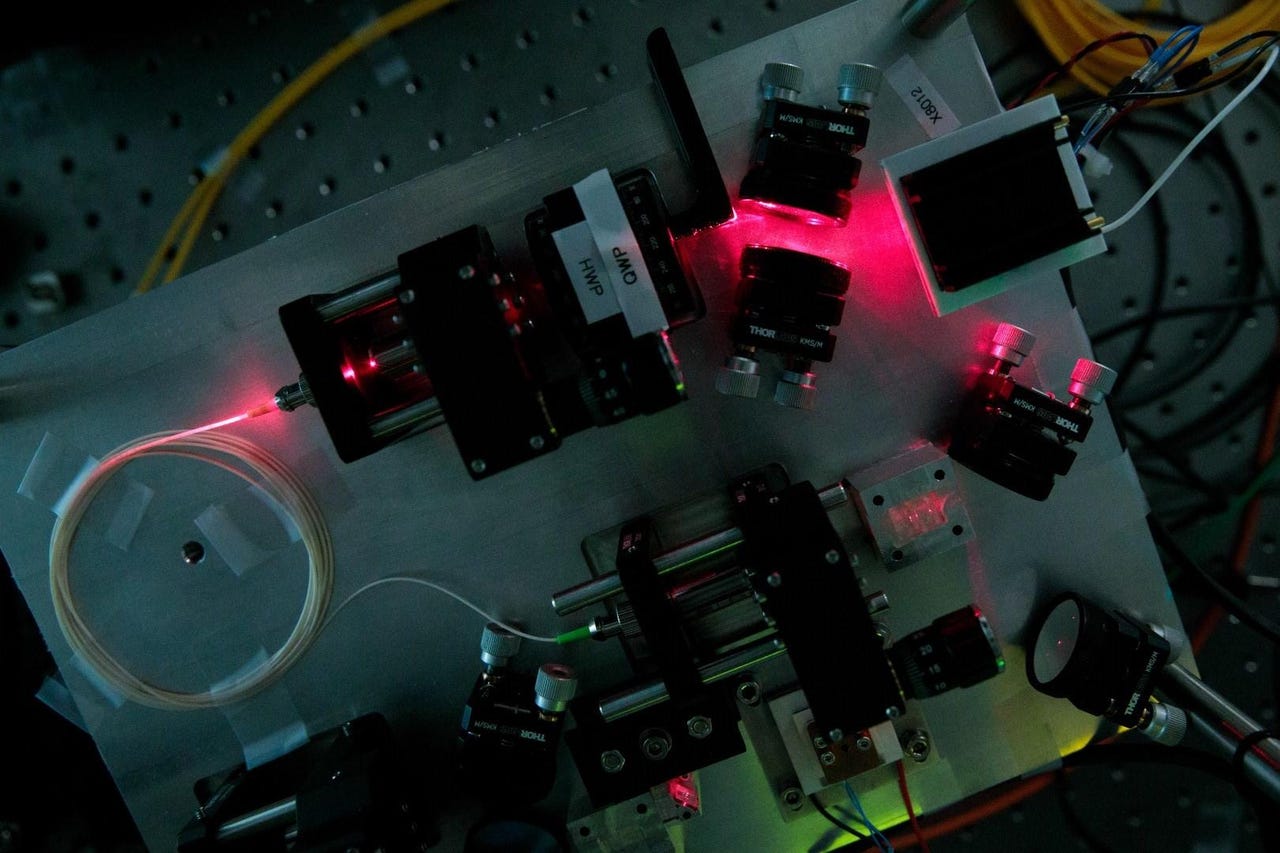Researchers in Singapore demonstrate new quantum key distribution technique over Singtel's fibre network


A device developed in the NUS-Singtel Cyber Security R&D Lab that creates photons that are connected by the quantum property of entanglement
The National University of Singapore (NUS) has announced that a team of researchers, working in partnership with Singtel, has demonstrated a new technique to advance quantum key distribution (QKD).
QKD, unlike traditional encryption that relies on mathematics to protect the transport of the key from one party to another, uses the principals of physics. It is a protocol that transmits light particles or photons over a network, so that two communicating parties can agree on and generate an encryption key to establish a secure communication channel.
According to NUS and Singtel, the researchers working out of the the NUS-Singtel Cyber Security Research & Development Laboratory in Singapore succeeded in coordinating the travel of a pair of photons -- one for each party -- through different fibre network paths and were able to precisely control the photons' arrival times.
The two entities said the photons may get out of sequence without using this technique, making it difficult for both parties to agree on an encryption key.
"The breakthrough achieved by the NUS-Singtel Cyber Security R&D Lab not only strengthens our defences in a new cyber reality where threats are becoming more sophisticated, it also positions Singapore as a hub for global QKD research. We will continue developing and fine-tuning this technology with the aim of commercialising it through our global footprint of product engineering centres," Singtel Group Enterprise CEO Bill Chang said.
The breakthrough was demonstrated over Singtel's fibre network, with NUS associate professor Alexander Ling saying the positive results indicate that current commercial fibre networks are ready for QKD.
The researchers are now working on developing the findings for actual use cases within government, military, and bank services, which is where Singtel said quantum-resistant secure communication is needed to provide long-term security.
Earlier this month, Canberra-based quantum cybersecurity firm QuintessenceLabs (QLabs) announced it had partnered with Tech Mahindra and BT for the development of an end-to-end video messaging application secured by QKD.
Explaining QKD further, QLabs CEO Vikram Sharma touted the proposition as making a device invulnerable to increasing computational power, new crypto-attacks, and quantum computers.
"If I send you a key which is encoded right at the quantum level -- in our case we do this by imprinting it on laser ... moving it on the frequency space -- and I do that hundreds of millions of times per second and I send it to you, if somebody tries to intercept that while it's in transit, because of the laws of quantum physics, their act of eavesdropping or interception will be revealed to you and I," he told ZDNet previously.
"We will then discard that key and we will only use a key when we've assured ourselves that there was no such interference, giving an absolutely secure way to transport the keys."
READ MORE
How the industry expects to secure information in a quantum world
With all of the good a quantum computer promises, one of the side effects is that it will be able to break the mechanisms currently used to secure information. But the industry is onto it, and Australia's QuintessenceLabs is playing a key role.
How quantum computing could create unbreakable encryption and save the future of cybersecurity (TechRepublic)
Photon-based quantum encryption could help companies better defend against cyberthreats, and it's one step closer to reality thanks to research from Duke University.
What will you actually use quantum computing for?
There's always a blue sky technology waiting in the wings, and for enterprise computing, quantum computing takes that role. With Satya Nadella convening a panel of Microsoft's best physicists at the end of his Ignite conference keynote, it's fair time to ask, what will this mean to the enterprise and how long will the adoption curve take?
How AI and machine learning will help the rise of quantum computing (TechRepublic)
When quantum computers come online, all encryption will fail. James Barratt explains how AI will aid the way for the emergence of quantum computing.